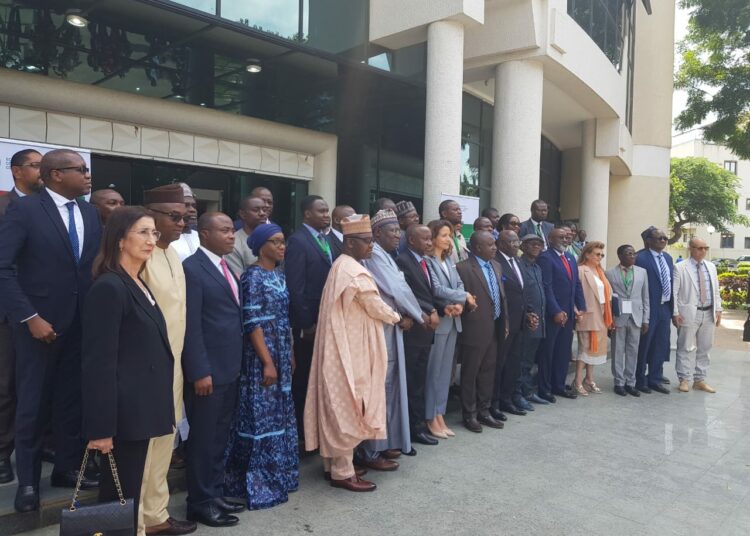The Ministers of Energy and Hydrocarbons of the Economic Community of West African States (ECOWAS) have brainstormed on how to strengthen regulatory framework to enhance energy efficiency in the region.
The gathering was a joint meeting for the Review and Adoption of Agreements on the African Atlantic Gas Pipelines and Regulation on the Establishment of ECOWAS Renewable Energy and Energy Efficiency Facility in collaboration with the Kingdom of Morocco and Mauritania.
The Ministers met in Abuja, the Nigerian capital city on Friday with a focus on the strategic institutional documents and the advancement of the hydrocarbon sector. These include; The Draft Intergovernmental Agreement (IGA) and Host Government Agreement (HGA) for the African Atlantic Gas Pipeline (AAGP).
Nigeria’s Minister of State for Petroleum Resources (Gas), Dr. Ekperikpe Ekpo, who declared the meeting open, said the African Atlantic Gas Pipeline was a major step forward in the vision of an integrated hydrocarbon and energy infrastructure within Africa.
He said, “The merger of the West Africa Gas Pipeline Extension Project (WAGPEP) and the Nigeria-Morocco Gas Pipeline Project (NMGP) into the African Atlantic Gas Pipeline Project (AAGP), following the decision at the 63rd Ordinary Session of the Authority of the ECOWAS Heads of State and Government of 9th July 2023, reflects our region’s strategic vision for a more connected and economically vibrant pipeline network.
“The Intergovernmental Agreement will serve as the framework guiding relations between the states involved, ensuring cohesive collaboration and equitable terms, while the Host Government Agreement forms the foundation of a mutually beneficial partnership that promises stability and predictability in our investment climate.”
According to the Minister, the African Atlantic Gas Pipeline, spanning from Nigeria through multiple ECOWAS countries to Morocco, is expected to unlock new markets and bolster energy security throughout the region.
“By linking the natural gas reserves in Nigeria to North Africa and Europe, this initiative expands opportunities for economic growth, industrialization, and job creation, benefiting communities across the linkage countries,” he said.
Commissioner for Infrastructure, Energy and Digitalization of ECOWAS Commission, Sediko Douka, in his remarks, said that the meeting was to provide update on the overall progress of the gas pipeline project and the necessary steps to consolidate efforts being made by partners.
He noted that the meeting highlighted the crucial nature of hydrocarbons to the region, adding that the project will serve all member-states of ECOWAS.
“We have reached a critical stage and it is essential for all parties to collaborate more to make it a reality. This project is of vital importance to the region because it will increase access to natural gas, boost electricity generation capacity and drive economic, industry and agricultural growth across the region,” he added.
Also speaking during the event, Nigeria’s Minister of Power, Adebayo Adelabu, who was represented by the Permanent Secretary of the Ministry, Mahmoud Mamman, said the establishment of the ECOWAS Renewable Energy and Energy Efficiency Facility represented a transformative step towards achieving regional energy goals.
“This facility will act as a catalyst for investments, providing the necessary support and incentives for both public and private sector projects.
“Through this initiative, we aim to create a robust network of stakeholders dedicated to sharing knowledge, resources and best practices. Together, we will overcome barriers and unlock the full potential of renewable energy and energy efficiency across our region,” he stated.
“After deliberations, these draft institutional documents we will be presented to the ECOWAS Heads of Government during the forthcoming meeting in December 2024. This is an essential step forward in solidifying regional commitments and advancing the energy future of West Africa.”
Minister of Energy Transition of the Kingdom of Morocco, Mrs Laila Bin Ali, said the about 6,000km pipeline project will strengthen local African resources and boost various sectors of the African economies.
She noted that through the pipeline project, Morocco is giving countries of the Sahel and others access to the Atlantic, adding that the infrastructure will ensure connectivity and prosperity once it is delivered.
“Morocco remains firmly committed to this connectivity project until it comes to fruition,” she said.
The Ministers of Energy from Ghana, Cabo Verde, Benin, Cote d’Ivoire, Guinea Bissau, The Gambia Guinea, Liberia, Sierra Leone and Togo as well as CEOs of national oil companies also attended the meeting.
We’ve got the edge. Get real-time reports, breaking scoops, and exclusive angles delivered straight to your phone. Don’t settle for stale news. Join LEADERSHIP NEWS on WhatsApp for 24/7 updates →
Join Our WhatsApp Channel










